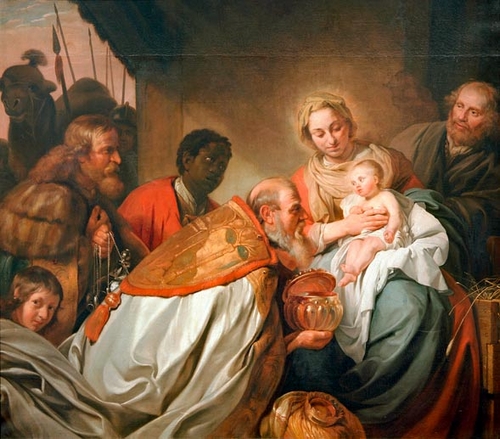
We can imagine those three girls dressed as the Kings, acting for their parents and their guests. Wolf, who accompanied them at the piano in this little performance, wrote a delicious song for those children he loved so much (they loved him, too). It had a different music for each King, getting ready for an ending where every girl could say goodbye in a long postlude so as they could get long applauses. They should have lots of fun while rehearsing!
And as I'm about to get my second short post in a row, I'll leave for another day to speak about Melanie and Wolf (I jotted it down in my blog notebook). Back to Epiphanias (that's the name of our song), today is December, 28th. Wolf composed his Lied on 27th and everything was ready by January, 6th; if you feel like trying it with your children, you’ve got plenty of time! To inspire you, here is the performance of Elisabeth Schwarzkopf and Gerald Moore, a must.
I wish you a wonderful New Year's Eve!
Die heiligen drei König mit ihrem Stern,
Sie essen, sie trinken, und bezahlen nicht gern;
Sie essen gern, sie trinken gern,
Sie essen, trinken und bezahlen nicht gern.
Die heiligen drei König sind kommen allhier,
Es sind ihrer drei und sind nicht ihrer vier:
Und wenn zu dreien der vierte wär,
So wär ein heilger Drei König mehr.
Ich erster bin der weiß und auch der schön,
Bei Tage solltet ihr erst mich sehn!
Doch ach, mit allen Spezerein
Werd ich sein Tag kein Mädchen mir erfrein.
Ich aber bin der braun und bin der lang,
Bekannt bei Weibern wohl und bei Gesang.
Ich bringe Gold statt Spezerein,
Da werd ich überall willkommen sein.
Ich endlich bin der schwarz und bin der klein,
Und mag auch wohl einmal recht lustig sein.
Ich esse gern, ich trinke gern,
Ich esse, trinke und bedanke mich gern.
Die heiligen drei König sind wohlgesinnt,
Sie suchen die Mutter und das Kind;
Der Joseph fromm sitzt auch dabei,
Der Ochs und Esel liegen auf der Streu.
Wir bringen Myrrhen, wir bringen Gold,
Dem Weihrauch sind die Damen hold;
Und haben wir Wein von gutem Gewächs,
So trinken wir drei so gut als ihrer sechs.
Da wir nun hier schöne Herrn und Fraun,
Aber keine Ochsen und Esel schaun,
So sind wir nicht am rechten Ort
Und ziehen unseres Wegen weiter fort.
The Three Holy Kings with their star,
they eat, they drink, and do not like to pay;
they like to eat, they like to drink,
they eat, they drink, and do not like to pay.
The Three Holy Kings are come,
there are three of them, not four:
and if to the three one added a fourth,
that would be one Three Holy King more.
"I am the first, white-haired and also handsome,
you should only see me by day!
but ah, with all these spices
I'll never win a maiden."
"I, however, am the brown-haired one and I am tall,
known well to Woman and Song.
I bring gold instead of spices,
and therefore I will be entirely welcome."
"And at last there's me, black and small,
and I'd like to have a good time as well.
I like to eat, I like to drink;
I gladly eat and drink and say thank you."
The Three Holy Kings are kindly.
They seek the Mother and the Child;
Pious Joseph is also sitting there,
and the ox and the donkey are lying upon the straw.
"We bring myrrh, we bring gold,
and the ladies will look kindly on this frankincense;
and when we have wine from good sources,
we drink, we three, as well as six can!
But here there are fine gentlemen and ladies,
and no oxen and donkeys to be seen;
so we are clearly not in the right place.
We shall continue on our way."












